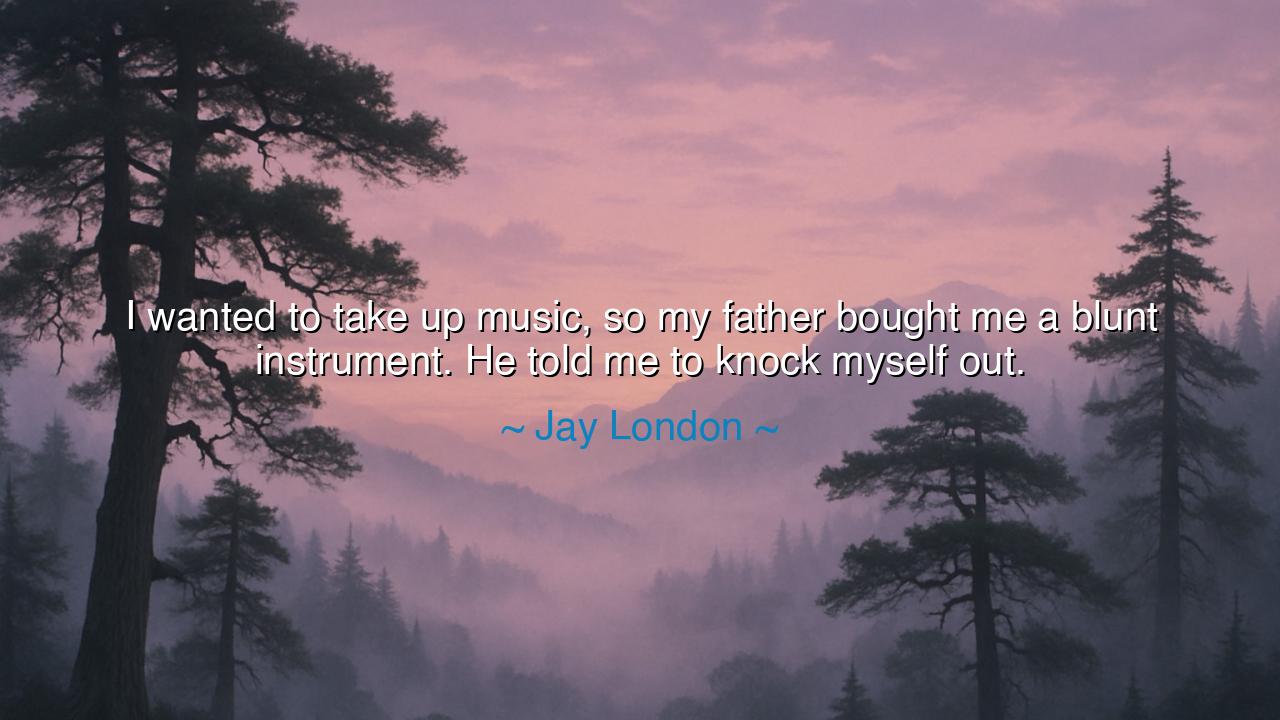
I wanted to take up music, so my father bought me a blunt
I wanted to take up music, so my father bought me a blunt instrument. He told me to knock myself out.






The words of Jay London—“I wanted to take up music, so my father bought me a blunt instrument. He told me to knock myself out”—appear at first as a jest, a stroke of humor born from the dry wit of a comedian. Yet as with all enduring humor, there lies beneath the laughter a whisper of truth—a glimpse into the timeless dance between dream and discipline, between youthful ambition and the stern love of a parent. In these few words, London captures both the absurdity and the tenderness that live within family relationships, where encouragement and irony often share the same breath.
To the ancients, humor was never merely frivolous. They understood that the jester’s tongue often carried the philosopher’s truth. The humor in this quote arises from contradiction—the son’s desire to create harmony through music, and the father’s ironic gift of a blunt instrument, a tool of noise rather than melody. The father’s response, “knock yourself out,” embodies the weary wisdom of experience. It is the sound of one generation, having labored through life’s trials, looking upon the fiery dreams of youth with both affection and realism. It is as if the father says, “Pursue your desire, but know that the world may strike back; learn through the bruises of your own striving.”
In Jay London’s playful exaggeration, we can hear the echoes of countless fathers through the ages—men who, out of love and fatigue, express their affection through humor instead of softness. His words carry the tone of that age-old parental paradox: the wish to protect one’s child, yet the understanding that no wisdom truly sinks deep until it is learned through hardship. The blunt instrument becomes a metaphor for life itself—unyielding, unrefined, demanding strength from the one who wields it. The father’s humor is both a shield and a mirror, reflecting the truth that every art, every dream, requires endurance, not ease.
History offers many who began their art with blunt instruments, both literal and figurative. Beethoven, before he was a master of harmony, endured a childhood of relentless discipline under a harsh father who demanded perfection. Though his father’s methods were cruel, they forged resilience in him, turning noise into genius, rebellion into music that still trembles through the ages. Like London’s father, Beethoven’s sought to teach through hardness what tenderness could not achieve: that greatness demands both struggle and patience. From such contradictions are legends made.
The humor in London’s quote also hides a deeper tenderness. For even in jest, the act of a father buying the instrument is a sign of support, however gruffly expressed. The father may jest, but he still provides the means for his child to explore his dream. This mingling of irony and affection is the language of family—the kind of love that hides behind teasing words, the kind that protects its vulnerability beneath laughter. In this way, London’s humor is not mockery, but homage: a recognition that fathers often show love not through sweet words, but through gestures wrapped in wit.
And so, what seems a simple joke becomes a meditation on generation and growth. The child seeks meaning, the parent offers experience; the two speak in different tongues, yet their dialogue forms the very rhythm of human life. The “blunt instrument” we are given by those before us—whether it be discipline, advice, or even a sense of humor—is not meant to wound, but to teach us how to make music from the rawness of existence. The father’s jest invites the son to strike, to experiment, to fail, and through failure, to learn.
The lesson, dear listener, is this: embrace the rough tools life gives you. The world will not always hand you a finely tuned instrument; often it offers you something blunt, heavy, and imperfect. Yet from such imperfection, true art and character are born. Do not resent the hardness of your beginnings, nor the humor with which others may meet your dreams. Take up your instrument, however crude, and play until your effort shapes it into beauty.
Thus, the wisdom hidden in Jay London’s jest becomes clear. His words remind us that humor itself is a form of resilience—a way to bear the trials of ambition and love alike. The father’s jesting gift teaches us that life may mock our first attempts, but it also invites us to laugh, to rise, and to try again. For it is through laughter, not lamentation, that the human spirit endures—and through endurance, that every blunt instrument becomes, at last, a tool of music and meaning.






AAdministratorAdministrator
Welcome, honored guests. Please leave a comment, we will respond soon